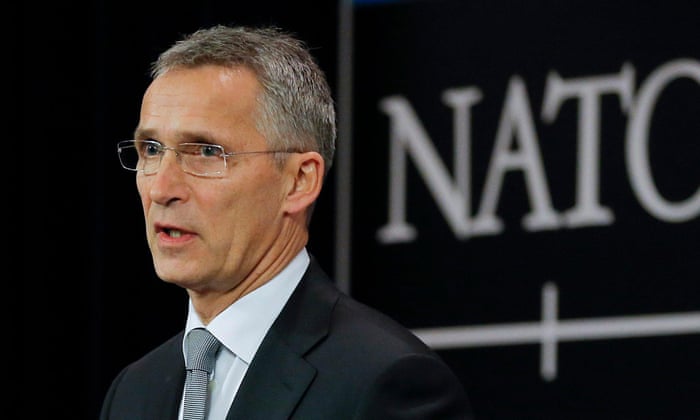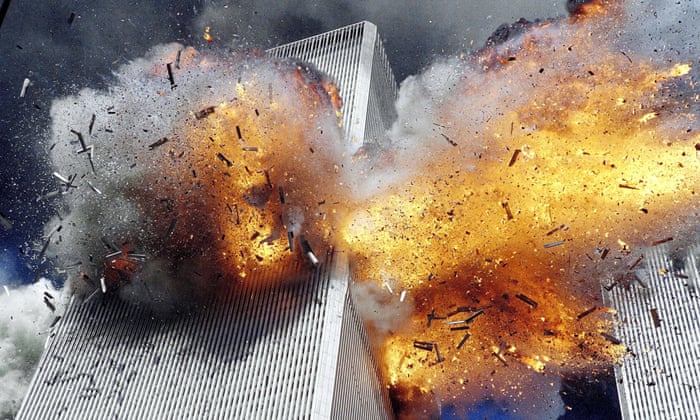Going it alone not an option, Nato chief warns Donald Trump
Exclusive: West facing its ‘greatest challenge to security in a generation’ says Jens Stoltenberg as he speaks of his fears for alliance between Europe and US

Nato secretary-general Jens Stoltenberg at a defence ministers’ meeting in Brussels in October. Photograph: Olivier Hoslet/EPA
 Nato’s secretary-general has issued a dramatic warning to the US president-elect Donald Trump: “Going it alone is not an option, either for Europe or for the United States.”
Nato’s secretary-general has issued a dramatic warning to the US president-elect Donald Trump: “Going it alone is not an option, either for Europe or for the United States.”
Writing exclusively in the Observer, the leader of the western military alliance, Jens Stoltenberg, claims the west faces its greatest security challenge in a generation.
He pointedly recalls the blood spilled by Nato allies after they came to the aid of the US following the 9/11 attacks and warns that, rather than “deepening differences” between the 28 members, now is the time to “nurture what unites” under “strong American leadership”.
In the months before his election, Trump described Nato as obsolete and raised questions over whether America under his leadership would come to the aid of a Nato ally under attack. Stoltenberg writes: “We face the greatest challenges to our security in a generation. This is no time to question the value of the partnership between Europe and the United States.
“The only time Nato has invoked its self-defence clause, that an attack on one is an attack on all, was in support of the United States after the 9/11 terrorist attacks. This was more than just a symbol. Nato went on to take charge of the operation in Afghanistan. Hundreds of thousands of European soldiers have served in Afghanistan since. And more than 1,000 have paid the ultimate price in an operation that is a direct response to an attack against the United States.”

Jens Stoltenberg points out that Nato members came together in support of the US after the terror attacks on 9/11. Photograph: Naomi Stock/Rex Features
Stoltenberg, who is a former prime minister of Norway, concedes that America’s Nato allies need to increase contributions, a demand made by Trump during the presidential campaign. America accounts for 70% of Nato spending.
But the head of Nato writes: “Naturally, we have our differences. But leaders on both sides of the Atlantic, and across the political spectrum, have always recognised the unique ties that bind us. Our proud history is one of common challenges overcome together.
“It is all too easy to take the freedoms, security and prosperity we enjoy for granted. In these uncertain times we need strong American leadership, and we need Europeans to shoulder their fair share of the burden. But above all we need to recognise the value of the partnership between Europe and America. It remains indispensable.”
Stoltenberg’s passionate intervention, just days after Trump’s shock election to the White House, highlights the deep concerns within European military circles about the new American president.
In July Trump had said that Nato was incapable of dealing with terrorism and that he would be willing to tell allies who did not “reimburse” America for its military protection: “Congratulations, you will be defending yourself.”
Stoltenberg, however, hits back, claiming that Nato is playing a “crucial role” in the fight against Islamic State, and in strengthening the capacity of partners in North Africa and the Middle East to combat terrorists.
He also writes that it is Vladimir Putin’s Russia which has become more “assertive” in recent years, and that the tens of thousands of troops the country is amassing across its western border should be treated as a genuine threat to which the west must respond. Trump has claimed that he will be able to build a strong relationship with Putin, and has attacked those who have encouraged a deterioration in relations with the Kremlin.
Stoltenberg writes: “We have implemented the biggest reinforcement of our collective defence since the cold war. And the United States has significantly strengthened its commitment to European security, deploying a new armoured brigade to eastern Europe and delivering equipment and supplies to support future reinforcements if needed. This is deterrence, not aggression. We do not seek to provoke a conflict, but to prevent a conflict.”
“Nato battalions numbering thousands of troops cannot be compared with Russian divisions numbering tens of thousands just across the border. Our response is defensive and proportionate. But it sends a clear and unmistakable message: an attack against one will be met by a response from all.” Stoltenberg’s comments, stressing the vital importance of America in maintaining European security, will be widely seen as a sign of concern over earlier statements by European commission president Jean-Claude Juncker. Last week Juncker claimed the Americans “will not ensure the security of the Europeans in the long term. We have to do this ourselves.” He added: “That is why we need a new start in the field of European defence, up to the goal of setting up a European army.”
Former foreign secretary Jack Straw said Juncker was guilty of “narcissism”, and that such
proposals would only push Trump away from Nato. “I think this is another example of serious error by Juncker,” he said. “Every time Juncker spoke during the referendum, he helped the Leave campaign. The EU wants to make a choice about whether it wants Nato to continue. What would be the purpose of a European defence force? It is a folie de grandeur, like other things the EU has done which has caused it to face its current existential crisis. It is frankly crackers. But it is illustrative of the weird and narcissistic world in which he operates.”
The Observer has, however, learned that France and Germany are planning to unveil proposals on European military integration in the coming weeks.
Norbert Röttgen, chairman of the foreign affairs committee in the German Bundestag, said that greater defence cooperation was even more important following Trump’s election. He stressed that it was a key area in which the UK should agree to compromise during Brexit negotiations. “We see in recent days that these geopolitical dangers and insecurities have increased and there is one most important asset – and that is unity of the west and European unity,” he said.
Nicole Ameline, a member of the French National Assembly’s foreign affairs committee, warned the world was now “more unpredictable” with Trump in the White House and called for the UK to play its part in a strengthened European defence structure, as an aid to Nato rather than an alternative. “We have to reinforce our security and to do that we need the UK,” she said.
Meanwhile the Foreign Office has confirmed that Boris Johnson, who branded vocal European concern about the US election result a “whinge-o-rama”, would not be attending an emergency EU foreign ministers’ meeting on Sunday to discuss Trump’s election.
“Nato battalions numbering thousands of troops cannot be compared with Russian divisions numbering tens of thousands just across the border. Our response is defensive and proportionate. But it sends a clear and unmistakable message: an attack against one will be met by a response from all.” Stoltenberg’s comments, stressing the vital importance of America in maintaining European security, will be widely seen as a sign of concern over earlier statements by European commission president Jean-Claude Juncker. Last week Juncker claimed the Americans “will not ensure the security of the Europeans in the long term. We have to do this ourselves.” He added: “That is why we need a new start in the field of European defence, up to the goal of setting up a European army.”
Former foreign secretary Jack Straw said Juncker was guilty of “narcissism”, and that such
proposals would only push Trump away from Nato. “I think this is another example of serious error by Juncker,” he said. “Every time Juncker spoke during the referendum, he helped the Leave campaign. The EU wants to make a choice about whether it wants Nato to continue. What would be the purpose of a European defence force? It is a folie de grandeur, like other things the EU has done which has caused it to face its current existential crisis. It is frankly crackers. But it is illustrative of the weird and narcissistic world in which he operates.”
The Observer has, however, learned that France and Germany are planning to unveil proposals on European military integration in the coming weeks.
Norbert Röttgen, chairman of the foreign affairs committee in the German Bundestag, said that greater defence cooperation was even more important following Trump’s election. He stressed that it was a key area in which the UK should agree to compromise during Brexit negotiations. “We see in recent days that these geopolitical dangers and insecurities have increased and there is one most important asset – and that is unity of the west and European unity,” he said.
Nicole Ameline, a member of the French National Assembly’s foreign affairs committee, warned the world was now “more unpredictable” with Trump in the White House and called for the UK to play its part in a strengthened European defence structure, as an aid to Nato rather than an alternative. “We have to reinforce our security and to do that we need the UK,” she said.
Meanwhile the Foreign Office has confirmed that Boris Johnson, who branded vocal European concern about the US election result a “whinge-o-rama”, would not be attending an emergency EU foreign ministers’ meeting on Sunday to discuss Trump’s election.
